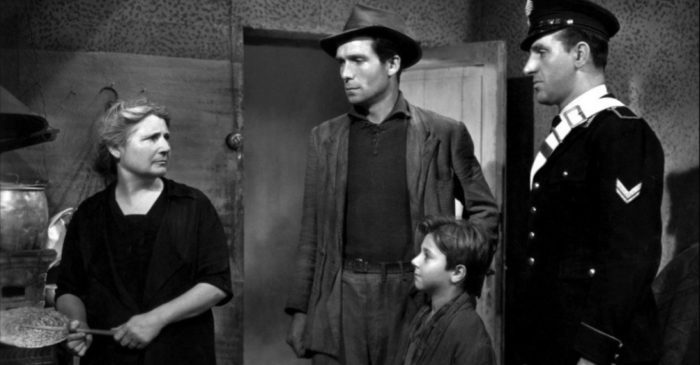
Aside from the highs and lows of tragedies and comedies, I think one of the most effective emotions for a story to tap into is frustration. At least for me, it’s consistently easy to empathize with characters who are put into helpless situations. It’s why villains like Harry Potter and the Order of the Phoenix‘s Dolores Umbridge and The Mist‘s Mrs. Carmody are so easy to hate. Couple that with some crushing disappointment and you’ve got a recipe for a deeply moving night. Just like the one I had in the wee hours of last night watching Bicycle Thieves!
Neorealism was a movement in post-WWII Italian filmmaking that was about showing gritty, working-class stories that were shot on location using non-professional actors. John kind of covered everything last year in his review of Umberto D. which was also directed by Vittorio De Sica. In the case of Bicycle Thieves, our attention is brought to Rome and the poor people living in it.
Antonio Ricci (Lamberto Maggiorani) is about a down-trodden as a man can be. The film begins with a crowd outside a job office begging for opportunities but poor Ricci is so defeated he’s just laying on the ground nearby. Fortunately enough, they actually do have a job for him: a good city job that requires he use the bicycle he pawned for food money last week. Nonetheless, Ricci takes the job and he and his wife (Lianella Carell) pawn their prized linen to get enough money to buy back his bike – it all worked out!
Beaming with pride and joy that he can take care of his family, Ricci begins his work putting up posters across town. His happiness is doomed, of course, as midway through his first day, while Ricci is up on a ladder, some thieves steal his unattended bicycle and mislead Ricci when he tries to get it back. The police tell Ricci that they can’t really help him find the bike, so he takes it upon himself to find the thieves before he loses his job.
Desperate Ricci enlists some friends and his son Bruno (Enzo Staiola) to scour the city’s markets for his bicycle or the man that stole it. Their search will take them to markets, a church, a brothel, and various neighborhoods all over Rome as their situation grows increasingly dire. As we see, the city is full of suffering, desperate people who are as caught up in their own difficulties as Ricci is with his. It’s a dog eat dog world and all that.
It is insane that Lamberto Maggiorani was a factory worker when he was cast in this film. The guy accomplishes so much with his looks – many of Bicycle Thieves‘ pivotal moments hinge on closeups of his face. They say the best actors draw from their own experience, and Maggiorani must have had plenty of that to use here, because he’s magnificent. Depressingly enough, his own real life took a similar arc to the film, as he was soon laid off from his job because he was considered a successful movie star, and never really found any other acting roles either. Bummer!
Bicycle Thieves is equal parts a story of a man and a bike and a story of man and his son. At one point, Ricci takes Bruno out for a meal and lays out what the whole movie is about. He gives his son the meal he wishes they could eat every night, explaining how good things could have been if he kept his job and implying how bad things must have been for these characters for a while now. All the while, a wealthy family gorges themselves nearby.
The last scene of Bicycle Thieves shows Ricci go beyond his breaking point and, when things look to be at their worst, finally find some mercy from his fellow man. It’s a moment that I need to think way more about – the emotional complexity of it is almost too much to bear. There’s hope and hopelessness, love and shame, fear and resolution. It’s moving and somehow quite brief, and the man and his son disappear into the crowd around them – just one of a million stories in Rome that day.


